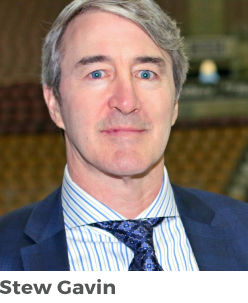Stew Gavin a former NHL veteran for 15 seasons with the Toronto Maple Leafs and Minnesota North Stars now aims the puck at protecting hockey players’ financial interests.
It was this goal that led him to set up the Gavin Management Group which aims to ensure athlete’s business affairs are organized and their interests protected. Since he retired in the mid 90’s from professional hockey, Gavin gained experience on Bay Street and qualifications that include his CFP before opening his own company in 2003. He says he has had finance in his blood since he was a young boy.
 “Growing up as a kid in a family of four, there wasn’t a lot of disposable income, so we were encouraged to get our own money,” He did this by doing jobs such as shovelling driveways. “We were taught to be somewhat entrepreneurial.”
“Growing up as a kid in a family of four, there wasn’t a lot of disposable income, so we were encouraged to get our own money,” He did this by doing jobs such as shovelling driveways. “We were taught to be somewhat entrepreneurial.”
His parents also encouraged him to learn about cash flow and investments around the time he turned pro. In the NHL offseason, Gavin would take financial planning or securities courses over the summer and meet a lot of interesting business people. After retirement, Gavin took up a managing role for the Dallas Stars but left as he wanted more practical experience.
When starting out with his own firm, marketing his business to hockey players was natural as everyone gravitates to their existing network.
“When I left the game, salaries had just started to take off. Now they’re questioning what they should do with all this money and that led me to finding a team approach to helping these players. ”
Trust is the biggest issue
The biggest issue hockey players often face is who they can trust, Stew said.
“At a high level, they need to make sure they have the right people managing their funds, and the right firm that understands them and has the right credentials for their needs,” he said.
While Gavin believes most financial planners could adapt to the new challenges that come when dealing with professional athletes, he said people like him have an advantage because he has been there and knows the hurdles they face and what events might happen to them.
“I can tell them what will happen, what they need to consider, there is also a mental side to it too. You also know how you can help with the problems and relate them to your own similar experiences and there is also the fact you know everyone in the industry from the coaches to the payroll staff,” he said.
For a financial planner looking to serve the hockey player niche, it can be very easy to get lost, says Gavin. “Many people may not even know where to start. You might enjoy hockey, but that doesn’t mean you know how to deal with players.”
There are many challenges a financial planner needs to be experienced in to serve this niche market including cash flow management, tax minimization and compliance, cross-border issues, purchase advisory, estate planning, risk management and independence forecasting.
Financial independence
Gavin says the main objective when working with hockey player clients is to make sure they have enough savings to retire and live off their money comfortably after their pro days are done.
“Our objective is to help the players have enough savings during their professional careers, so when they retire, they can generate enough income from their investments to maintain their standard of living, so they will never need to work again.”
With the aim of making players financially independent upon retirement, Gavin said his company uses methods such as education, investment, long term planning or showing them graphs to demonstrate their targets. Players starting out in their careers often face challenges that many people their own age don’t face, he adds.
“Many young players are not prepared for, nor equipped to handle, the stress that comes with sudden wealth. Nor do they anticipate how quickly they can go through that money if it is not managed and planned for in an appropriate manner; or how short-lived the lifestyle can be when confronted with injury or other circumstances that often abruptly end a professional athlete’s career.”
Older players often face issues with high risk, near the end of their career, especially if they want to spend a lot of money on a house or other major purchase. Gavin and his team help players decide if a major purchase would be a high risk to their savings goal.
When it comes to financial education, Gavin says one goal is to explain to players that they don’t need to aim for high rates of investment return.
“We aim for a modest rate of five per cent as that five per cent might be all they need to hit every year to set them up for life.”
Working with hockey players or other professional athletes means Gavin often receives complex or even unusual requests.
“They seem to always lose their wallets as they’re always on the road, so we act on their behalf to cancel cards and have them reissued, but also check that the players have not been victims of any fraudulent activity. We also get requests from players who are getting married or getting divorced and want advice.” Players will often ask Gavin’s advice about issues involving friends and family. “They may want to help out their family or friends, or they’re unsure how to approach a situation from a friend who has a business idea.”
Find your niche
While hockey was his natural market, Gavin believes that anyone in the financial planning or related sectors such as insurance should specialize their talents.
“I really believe people should specialize and develop a niche or deal with a certain group of clients. It can add a lot of value and you know a lot of things about what they face. You can understand them and be a good sounding board.”







